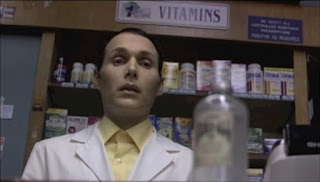Polish Cinema: In Darkness (Agnieszka Holland, 2011, Poland/Germany/Canada)
In
Darkness is a fitting title for Agnieszka Holland’s 2011 film, which tells
the true story of a group of Jewish refugees who found refuge in the sewer beneath
the city of Lvov during World War II. Much of the film takes place in the sewer, and as such most
of the film is bathed in literal darkness. This darkness also extends to the
events of the film – the Nazi-occupation of Lvov. In Darkness captures
the polyglot, multi-ethnic feeling of the city – now part of Ukraine but at the
time part of Poland and prior to that part of the Habsburg Empire. The
characters of the film – Poles, Jews, Ukrainians – alternate between language
mid-conversation, speaking Polish, Yiddish, and German, among other languages.
Our
protagonist is Leopold Socha (“Poldek”), a local sewer inspector. Poldek’s
heroism initially comes out of opportunism – he is looking to make a quick buck
off of the Jewish refugees, who pay him to bring them food. Eventually the risks
of this arrangement begin to outweigh the benefits, and Poldek finds himself in
a situation – almost to his own surprise – where he must help the refugees at
great risk to himself. Holland is careful not to make Poldek too pure – we see
that he is cynical about the whole situation and Jews in general. That being
said, his portrayal by Robert Wieckiewicz is the most fully realized character
in the film.
The rest
of the characters – primarily the refugees – are less memorable. It seems that
scriptwriter David Shamoon tends to rely more on tropes in this regard – the noble
one, the religious one, the adulterous one, etc. One other issue of the film is its length. While we do feel the claustrophobia and paranoia of the refugees,
the repeated scenes in the sewers begin to blur into one another at a certain
point, creating a film which feels less forceful and more meandering than it should be.
6/10



Comments
Post a Comment